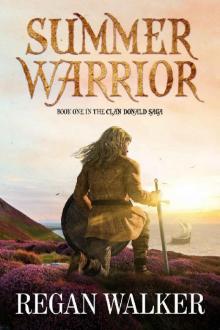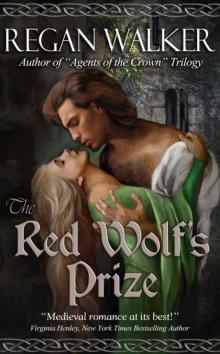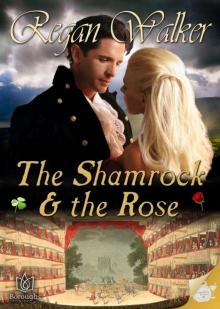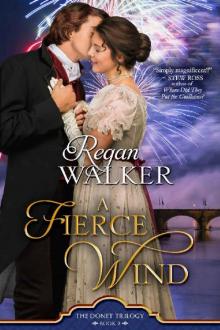- Home
- Regan Walker
Once Upon a Christmas Past Page 3
Once Upon a Christmas Past Read online
Page 3
“Welcome, Lady Claremont,” he said with a pronounced brogue, lifting his cap in greeting. “Allow me to introduce myself. I am Captain Dougal Anderson of William Stephen’s shipbuilding. Your fellow passengers will be pleased to hear of your arrival.” Then with a chiding tone, “They were afraid we might have to leave you behind.”
“Stuff and nonsense!” the countess scolded in a commanding voice. Her back as straight as steel, her head held high, she confronted the captain nose to nose. A formidable woman, thought Nash. Definitely not one to be intimidated by the unsmiling captain. “I am an adventurer at heart, my good man, and I love to sail, this dashed cold weather notwithstanding.”
Lady Claremont moved aside, allowing the captain to view the woman with light brown hair and white mobcap who had been waiting patiently behind her mistress. “I have brought my cook, Mrs. Platt.”
“An English cook for my… my ship?” the captain sputtered.
Ormond turned to wink at Nash, clearly enjoying the exchange.
“No, no, my good man,” the countess scolded as if addressing a schoolboy. “For our Christmas feast in Scotland.” Then to her cook, she muttered, “One could not expect Mr. Stephen’s cook to serve up a proper roast goose, minced pie and plum pudding.”
The countess returned her attention to the captain. “Mrs. Platt’s supplies are in a crate sitting on the quay. Please have it loaded promptly.”
“Now see here—” The captain began, but stopping himself, he let out an exasperated huff and snapped his fingers at a waiting seaman, who hurried down the gangplank to retrieve the crate.
Ormond covered his mouth, stifling a laugh.
Nash pressed his lips together, holding in his own laughter, thankful Robbie chose that moment to emerge from the aft hatch to approach their small group.
The countess glanced from Robbie to Nash. “Another?”
“Twins,” said Nash, managing a small bow. “Nash Etienne Powell, at your service, my lady.” He gestured to Robbie. “This is Robert Pierre Powell, older than I by a mere five minutes yet he will not let me forget it.”
The countess perused them. “Humph. I believe I may know one of your older brothers. Sir Martin. Yes, that’s the one.”
Nash had always been amazed at the power of his brother’s charm over the ladies, but when Robbie bestowed his most brilliant smile upon the elegant countess and bowed over her hand, Lady Claremont had a very different reaction than Nash had expected.
She picked up a quizzing glass, dangling from a gold chain around her neck, and carefully examined Robbie through the lens. Dropping the glass, she said, “You must keep hearts in the ton all aflutter, Mr. Powell. I shall have to keep an eye on you.” Then she turned to Nash. “You, too, I daresay. How confusing it will be if you have a smile like your brother’s.”
Nash thought to show her just how alike he and Robbie could appear but, just then, the captain pulled a pocket watch from his waistcoat, gave it an anxious glance and frowned. Narrowing his gaze at the Thames, in a tone that brooked no dissent, he said, “I would ask you and your servant to go below, Lady Claremont. We are about to sail.”
Dinner in the captain’s cabin that evening turned into an interesting one for Robbie, as he suspected it did for Nash.
A table from the crew’s mess had been added to the captain’s table and they all squeezed in for a meal of chicken, fried in the way of the Scots, roasted potatoes and a dark green vegetable the captain called “kale”. Robbie thought it a sad cousin to cabbage. When sampled, it tasted sour, like he imagined old newspapers would taste if he ever had a mind to eat them.
The chicken and potatoes were quite good, however, and were soon consumed. Everyone, save the captain, pushed the kale around their plates as if too distracted by the engaging conversation to partake.
Robbie was not fooled. Neither was Nash, judging by the look they exchanged. But the company made up for the strange vegetable.
Joining the men was Ormond’s wife, the former Lady Mary Campbell, a young aristocrat with pale blonde hair and eyes the color of green jade, whose features were as delicate as Dresden porcelain.
Next to the Ormonds sat Nick’s wife, the former Tara McConnell of Baltimore, a darker blonde than Mary and with blue-green eyes Nick said were the color of a tropical lagoon. Tara was a beguiling creature who knew ships and sailing as well as Nick.
On the other side of the table sat Martin’s wife, the redheaded Lady Katherine Powell, or “Kit” as she liked to be called. Her blue eyes, lighter than those of her husband’s, always seemed to take in much. Robbie wondered if she had brought her sketchbook because she was rarely without it.
Martin was the only one of Robbie’s brothers who had the blue eyes of their mother. He had met his wife Kit, the daughter of an earl, in an exclusive brothel, a meeting they claimed stemmed from a misunderstanding. Martin refused to discuss the affair, but Robbie had been in enough brothels to wonder what a lady like Kit would be doing there.
Since they were all close, unless in public, they addressed each other by their Christian names, except for Hugh, Lord Ormond, who had always been addressed by his courtesy title, or so Robbie had been told. Like the Powell men, Ormond had accepted special assignments from the Crown. And, if the tales were true, his wife, the rebellious Lady Mary Campbell had done a bit of spying herself in France.
Joining the young wives in their twenties was the Countess of Claremont, sitting to the captain’s right, her feathers floating above her head like exotic plumage on a rare bird, so tall they threatened to brush the cabin’s overhead beams. The flickering light from the lanterns only added to the illusion. Robbie had to admit she struck an elegant figure with her long strands of pearls over her silver brocade gown adorned with much lace.
The sobriquet The Grand Countess came instantly to mind.
Lady Claremont dropped her gaze briefly to the uneaten kale on her plate, a flicker of distaste crossing her face, then raised her eyes to the captain. “How is my dear friend Emily, Captain? I miss her greatly. It’s been half a year since that husband of hers brought her to London for a visit.”
“You will have to ask her, my lady,” replied the captain. “But from all appearances, she is thriving. They are expecting their first child in the spring.”
“Oh my! That is good news,” said the countess. “I shall have to scold her for failing to tell me.”
“Something to celebrate,” chimed in Ormond, raising his glass of claret in toast. “I expect my friend Stephen has several bottles of champagne chilling in the snow even now.”
The steward entered the cabin just then followed by two other men. At the captain’s nod, they began gathering up the plates and used tableware. From the relieved expressions on the faces of his fellow passengers, Robbie was not the only one glad to see the kale disappear.
A short while later, the steward returned carrying a large steamed pudding. The sweet scent of oranges wafted through the air amid exclamations of delight.
Robbie’s mouth watered.
Kit, accepted a slice of pudding. “That smells wonderful.”
“I love orange pudding,” said Tara, taking a bite and groaning with pleasure.
“The fruit comes from Lady Emily’s orangery in Arbroath,” stated the captain. Looking around the table, his face set in a stony expression, he added, “As did the kale.”
Robbie fought a grin.
Nash cleared his throat. “Ah… Captain, I am interested in orangeries and what can be grown in them. Has Mr. Stephen been long at it?”
Robbie was unsurprised at Nash’s question. He would be the one to try and smooth an awkward moment, especially if he could do so while inquiring about a subject of genuine interest.
“Nay,” returned the captain. “He built the orangery for the mistress when he added to the house. He shipped in mature orange trees from his father’s orangery in Aberdeen so she would have fruit this winter. She also has a vegetable garden and flowers in pots and is experimenting w
ith growing pineapples.”
“I’ve read about growing pineapples in orangeries,” offered Mary. Then to her husband, “I’d like to grow them at our country house. It would give me something to do, darling, while you are training that new crop of thoroughbreds. What say you to an orangery?”
“Our two boys do not keep you sufficiently occupied?” Ormond teased with a decidedly wicked grin. “Perhaps we should have another.”
Mary swatted him on the shoulder. “Silly man. When I’m not teaching the boys to ride their ponies, think how much fun they will have in the winter months puttering in the orangery.”
Ormond kissed his wife’s cheek. “Very well, my love, you shall have one.”
Robbie had seen the two tease each other before and admired the affection between them. But marriages like those of his two older brothers and the Ormonds were not the usual.
“There’s more pudding, Captain, should anyone want some,” offered the steward.
Nick held up his fork. “Over here, if you will.”
The steward hastened to comply.
“Here, too,” said Martin, catching the steward’s eye.
Robbie met Nash’s gaze. Both asked at the same time, “Brandy?”
The stern captain bestowed upon them a rare smile. “Aye, good French brandy. Mr. Stephen insists upon it.”
Once the steward had poured the brandy, the conversation settled into the current topic on everyone’s mind… politics.
Ormond leaned forward. “What’s the mood in Scotland, Captain?”
“In Arbroath, ’tis quiet enough, but just south in Dundee and to the west in Glasgow there has been great discontent on the part of the weavers.”
“The massacre in Manchester has not helped the situation,” muttered Nash.
The captain nodded gravely. “’Tis stirred everyone up.”
“And the Six Acts Lord Sidmouth has just introduced will make matters worse,” Robbie tossed in.
Captain Anderson drew his dark brows together. “Six Acts?”
Robbie realized the news of the new legislation must not have reached Scotland and, from the looks on the faces of his brothers and their wives, some in London were not yet aware.
His fellow dinner companions turned to Robbie with expectant gazes, so he explained what he had read that morning in the Times.
“I don’t see how that will help,” said Martin.
The captain shook his head. “The government taxes a poor man’s bread yet denies him a vote in Parliament. Even the Duke of Hamilton, Lord Lieutenant of Lanarkshire, which includes Glasgow, has spoken against the unfairness to the weavers.”
Mary glanced at her husband. “It helps when a person of station advocates for justice.”
“Well,” said Ormond, running a hand through his dark hair, “I grant you there would certainly be less discontent if all who are excluded from voting were to be exempted from the payment of taxes.”
“An unusual suggestion for a member of the nobility,” Nick interjected. “But fair.”
“As a Whig, I support reform,” said Ormond, “but the great beast of government can be difficult to turn. My father, the Duke of Albany, is trying in the Lords.”
Mary gave her husband an encouraging smile.
“Obviously, the English government has not changed since the days America and England parted ways,” put in Tara, the look in her eyes intense. “We had the same problem.”
Nick patted his wife’s hand. “America is her own country now, sweetheart.”
“Thank God,” murmured Tara.
Martin leaned toward the captain. “Kit and I lived through the rebellion in the Midlands two years ago. I hope that does not happen to you in Scotland.”
“Em…” The captain stared into his brandy as if unsure of what to say. “It might. There’s been a wee bit of rioting in Paisley, put down by the cavalry. And last month in Dundee, south of Arbroath, George Kinloch, a respected man of the gentry, gave a stirring speech to ten thousand Scots, condemning the blood spilled in Manchester and urging reform.”
Martin’s brows rose. “Ten thousand, you say?”
“Aye. And the crowd listened, too. Still, for that wee speech, Kinloch is to be tried for sedition. I hear the poor man is now on the run.”
Robbie met his brother’s gaze across the table.
Kinloch, the very man we’ve been sent to Scotland to find.
Chapter 3
Arbroath, Scotland, 18 December
“Wait for me!” Ailie shouted, running to catch up with Emily who was trailing William as he strode toward the ship that had just arrived from London.
Emily paused and turned back. “You need not run. I’m happy to wait.” In her blue woolen gown and MacTavish red and blue tartan pulled over her black hair, Emily looked more like a Scot than an English aristocrat. Only her proper English speech gave her away.
Ailie preferred to wear the Ramsay blue tartan of her mother’s clan, but the Stephens were a sept of Clan MacTavish and William always wore that clan’s red plaid, as did his new wife.
Slipping her arm through her sister-in-law’s, Ailie strolled with Emily toward the dock, leaning in to say, “I wouldn’t dare meet our guests from England without you.”
Behind them, the sun had dipped low in the sky even though it was still afternoon. Winter days were short, cold and windy. While there had been no new snow, much of what remained on the ground and roofs from the last storm had not melted. The frigid wind out of the west made Ailie shiver.
“You must be anxious to see your friends,” said Ailie.
“I am, especially Muriel and the Ormonds. The others I have yet to meet. Won’t it be wonderful to have company for my first Christmas in Arbroath?” Her heather-colored eyes glistened. “I’ve not told Muriel of my good news.”
They reached the dock just as the crew began lowering the gangplank. The passengers stood at the rail, a few waving to her brother.
Even from a distance, Ailie could see the women’s fine coats, stylish hair and hats marked them women of quality. The older woman, whom she assumed to be the dowager countess, wore a hat with grand feathers.
Londoners, the lot of them.
“William says the Powells are in the shipping business,” she said to Emily. “I do hope you aren’t bored with all the talk of ships.”
“Oh, do not worry about me, Ailie. I will be happy to visit with Muriel and hear the news from London. Besides, Lady Ormond and the other two wives are mothers of young children. I will enjoy hearing about their experiences.”
Ailie squeezed Emily’s arm and smiled at the woman she had come to consider a sister. “You’ll have your own bairn in the spring.”
They arrived at the gangplank and took their place beside Will.
Now that she was closer, Ailie studied the men and women standing at the rail. All the men had dark hair, making her think of the man she had seen in her dream. All were tall. Two appeared identical except for their clothes. Two of the women had blonde hair; the other was a redhead, whose hair color was somewhere between Ailie’s ginger and Will’s auburn.
The countess stood next to Captain Anderson, her age and feathers setting her apart from the other women. She pulled a white handkerchief from her reticule, flicking her wrist to swish the white cloth in the breeze.
“Oh, look!” exclaimed Emily. “Muriel is waving to me.”
Captain Anderson descended the gangplank first, leading the countess. One of the tall dark-haired men followed, holding the hand of a pretty woman with fair hair confined in a knot at her nape beneath a small hat set at a jaunty angle.
Will offered his hand to the shipmaster. “Welcome back, Dougal. A good trip?”
“Aye, sir.” Always polite, Captain Anderson tipped his cap to Ailie and Emily.
While Will spoke briefly with the captain, Emily greeted the countess and the tall dark-haired man and his beautiful wife, bestowing a huge grin upon the three of them. “Welcome to Scotland.” Then she brushed the
countess’ cheek with a kiss. “Muriel, it is so good to see you.”
“Too long is what it is,” admonished Lady Claremont. “Took my venturing to this land of snow and ice to see this place where you live.”
“Well, it’s time you came,” said Emily, hugging Lady Ormond and offering her hand to Lord Ormond, who bowed over it. All quite proper, Ailie noted. Rusty from disuse, she wondered how she would cope with all the bowing and formal address.
Not wishing them to think ill of her, she smiled at the attractive couple and the countess.
“Allow me to introduce my sister-in-law,” said Emily, “Miss Aileen Stephen.”
The countess reached for a small round glass hanging from a chain around her neck and peered through it at Ailie, examining her as if inspecting a bolt of new silk. Trying not to be put off by the odd gesture, Ailie returned the countess a small curtsey. “’Tis good to meet you, Lady Claremont. I have heard much about you from Emily.”
“Humph,” muttered the countess. “Don’t believe half of it.” She let her glass drop. “I can see you bear watching, pretty thing that you are. Unwed, Emily wrote me.”
“Oh my,” said Emily. “Muriel has you in her sights!”
Ailie felt her cheeks heat with embarrassment. She had no wish to be of special concern to the matchmaking countess.
The captain left Will and returned to the gangplank to see his other passengers off the ship. She could tell from the way they descended the gangplank the Powells and their wives were as at home on a ship as she was.
Will turned his attention to the Ormonds and Lady Claremont. “I see my wife has welcomed you.” Drawing Emily close, he said, “’Tis time we met our other guests, Leannan.”
Ailie’s heart was in her throat as she took her place beside Emily and William, prepared to meet the Powell brothers and their wives. Edinburgh was home to a fair number of English and she had been there many times, but she had never entertained them in her home. Emily didn’t count. She was English, aye, but she was also family.

 Summer Warrior (The Clan Donald Saga Book 1)
Summer Warrior (The Clan Donald Saga Book 1) Echo in the Wind
Echo in the Wind Once Upon a Christmas Past
Once Upon a Christmas Past A Secret Scottish Christmas (Agents of the Crown Book 4)
A Secret Scottish Christmas (Agents of the Crown Book 4) The Holly and the Thistle
The Holly and the Thistle Racing with the Wind (Agents of the Crown)
Racing with the Wind (Agents of the Crown) Wind Raven (Agents of the Crown)
Wind Raven (Agents of the Crown) Rebel Warrior (Medieval Warriors #3)
Rebel Warrior (Medieval Warriors #3) King's Knight (Medieval Warriors Book 4)
King's Knight (Medieval Warriors Book 4) The Twelfth Night Wager
The Twelfth Night Wager The Red Wolf's Prize
The Red Wolf's Prize The Shamrock & the Rose
The Shamrock & the Rose A Fierce Wind (Donet Trilogy Book 3)
A Fierce Wind (Donet Trilogy Book 3) Against the Wind (Agents of the Crown Book 2)
Against the Wind (Agents of the Crown Book 2)